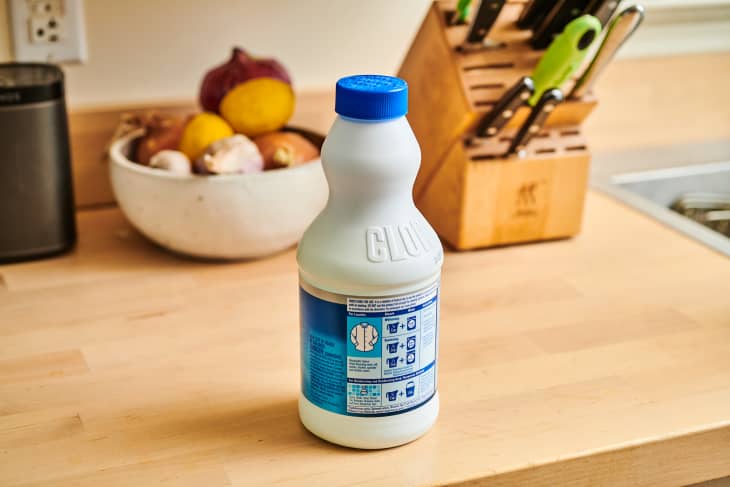Yes, Bleach Expires — Here’s What You Need to Know About Its “Expiration Date”

Whether you’re fighting tough laundry stains on your whites or you’re disinfecting your bathroom surfaces, bleach is a must-have multi-tool. But when it comes to bleach, you might have some questions, like does bleach expire? If so, after how long? And what’s the best way to store bleach so it works as well as you need it to for a longer period of time?
Does Bleach Expire?
After a year, the active ingredient in bleach — which makes it so good at cleaning and disinfecting — breaks down, so it’ll be less effective. This process can be sped up by improper storage, so it’s important to keep bleach in a cool, dry place away from sunlight, like a cabinet or closet, and out of reach from kids and pets.
Like any other cleaning product, you should always take care to use bleach safely — and that includes watching the expiration date. Below, learn more about how long you can use that jug of bleach in your cabinet, and the best way to store it, according to a cleaning expert.
Does bleach expire?
Bleach, as you might expect, doesn’t last forever — and it’s important to be mindful of this, especially if you’re using bleach to stave off germs in your bathroom, kitchen, or anywhere else in your home.
The active ingredient that makes bleach so effective at cleaning and disinfecting — sodium hypochlorite — breaks down into salt and water. “Exposing bleach bottles to sun or heat speeds this process up and can cause bleach concentration to drop below the level needed for EPA-registered disinfecting and sanitizing uses,” says Mary Gagliardi, aka Dr. Laundry, the in-house scientist and cleaning expert at Clorox.
After a year, the natural breakdown of the bleach active ingredient accelerates, regardless of how the bottle is stored. But improper storage, Gagliardi says, can speed up this process. So it’s important to follow certain steps if you keep bleach on hand at home. (More on that below.)
One caveat: While bleach can become less effective, most bleach products don’t list expiration dates like food does. “Instead, bottles are stamped with a production code that includes the date the bottle was made,” says Gagliardi. “That’s because an expiration date would only be accurate if the bottle is properly stored.”
It’s easy to read the production code on a bottle of bleach, and common brands like Clorox have clear, step-by-step instructions to make sure you use the products safely and effectively.
What can happen when bleach expires?
As Gagliardi explained, bleach will work less reliably when it’s past its prime (and that’s whether you store it improperly or use it past a year). Your concentrated bleach or bleach-based products might not kill germs as effectively if it’s older than a year, but you can still use them for cleaning (but not sanitizing or disinfecting). You’ll just need to use more than you normally would. “Cleaning toilets is a great way to quickly use up bleach that is more than a year old,” Gagliardi says.
What’s the best way to store bleach to keep it long-lasting?
Always store unopened or opened bleach in a cool, dry place away from direct heat or sunlight, like a closet or cabinet. And if you have kids, pets, or anyone else vulnerable at home, always be careful to keep your bleach (and any other potentially harmful chemicals, like ammonia) in a high or locked cabinet. Safety first!